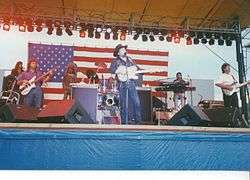The Waylors
| Waymore's Outlaws | |
|---|---|
|
Waylon Jennings and the Waylors at the Rocky Gap festival in 1991 | |
| Background information | |
| Genres | Country |
| Years active | 1961–present |
| Associated acts |
Waylon Jennings Shooter Jennings |
| Website | http://www.waymoresoutlaws.com |
| Members |
Richie Albright (1961-present) Jerry Bridges (1980-present) Fred Newell (1996-present) Tommy Townsend |
| Past members |
Jerry Gropp (1961-1968) Ralph Mooney (1976 -1996) Johnny Gimble (1976-2002) Paul Foster Rance Wasson (1980 - 2002) Gordon Payne (1980 -2002) Cliff Robertson (1980 - 2002) Carter Robertson (1980 - 2002) Reggie Young Barney Robertson |
The Waylors, later Waymore's Outlaws, were the backing and recording band of country music singer Waylon Jennings. Jennings formed the band in 1961, consisting of Jerry Gropp on the guitar and Richie Albright on the drums after moving to Phoenix, Arizona. The band earned a local fan base during its appearances on the night club JD's.
In 1965 RCA Records signed Jennings to a contract. The conservative restrictions of the producers of the label did not allow him to record with the Waylors. In 1972 he renegotiated his contract, and he included the Waylors for the first time on a RCA album in Honky Tonk Heroes. The lineup was expanded during the next decade, they backed Jennings until his death in 2002.
Today, the group, performs on its own with Tommy Townsend as their lead vocalist, with occasional performances as the band for Albright's namesake son of Waylon Jennings, Waylon Albright "Shooter" Jennings.
Background
Waylon was being managed by Buddy Holly's former first manager 'Hi-Pockets' Duncan who recommended Waylon to Buddy. With money out of his own pocket, Buddy produced Waylon's first record, a Rock & Roll version of 'Jolie Blon' & Waylon is considered to be Buddy's 'protoge'. In 1959 Buddy Holly hired Waylon Jennings to play electric bass for him during his "Winter Dance Party Tour".[1] After a show in Clear Lake, Iowa, Holly chartered a plane for himself, Allsup and Jennings to avoid a long bus trip to Fargo, North Dakota. This is because the tour organizers provided very inadequate transportation & the buses broke down in freezing weather. Jennings gave up his seat to J. P. Richardson, who was suffering from a cold and complaining about how uncomfortable a long bus trip was for a man of his size.[2] During the early morning hours of February 3, 1959, later known as The Day the Music Died, the charter crashed outside Clear Lake, killing all on board.[3] Jennings and Allsup continued the tour for two more weeks, featuring Jennings as the lead singer.[1] When the tour ended, he returned to his DJ spot on KLLL and performed regionally.[4]
Phoenix and the Nashville sound
In 1961, Jennings lived briefly in Coolidge, Arizona working in radio, before moving to Phoenix, where he formed The Waylors, consisting in Jerry Gropp on the guitar and Richie Albright on the drums.[5] Jennings and his band performed at a newly opened nightspot called JD's. The band earned a small fan base, eventually signing with the independent label Trend Records. In 1963, Jennings signed a contract with A&M Records.[5][6] Jennings and The Waylors recorded an album on BAT called Waylon at JD's.[7] Singer Bobby Bare, who covered Ian Tyson's "Four Strong Winds" and Jenning's "Just To Satisfy You", recommended Jennings to producer Chet Atkins, who signed Jennings to RCA Victor in 1965.[8]
Jennings was accustomed to performing and recording with his own band, The Waylors; a practice that was not encouraged by powerful Nashville producers that instead used session musicians. Over time, however, Jennings felt limited by the Nashville sound's lack of artistic freedom.[9] The music style publicized as "Countrypolitan" was characterized by orchestral arrangements, and the absence of traditional country music instruments.[5] By 1972 he renegotiated his contract with RCA, that gave him complete creative control over his works. [10] For the recording session, Jennings replaced the typical studio musicians of Nashville sessions with his band.[11][12][13]
Later Years
By the 1980s the lineup included the additions of Ralph Mooney, Johnny Gimble, Rance Wasson, Gordon Payne, Jerry Bridges, Cliff Robertson and Carter Robertson.[14]
Mooney retired in 1996 and was replaced by Fred Newell, an established Nashville studio player. The band backed Jennings until 1999 when he formed a short-time project, The Waymore Blues Band, which was Jennings' "hand-picked dream team." Waymore Blues Band backed him until his death.
Now known as Waymore's Outlaws, the band continues today, with Tommy Townsend as lead guitar and vocalist. In 2014, the Outlaws came full circle by playing with Waylon's son and Richie Albright's namesake Waylon Albright "Shooter" Jennings for the first time on tour. [15]
References
- 1 2 Carr & Munde 1997, p. 155.
- ↑ Texas Monthly, January 1988; p.108
- ↑ Everitt, Rich 2004, p. 18,19.
- ↑ Dansby, Andrew (February 14, 2002). "Waylon Jennings Dead at Sixty-four". Rolling Stone. Wenner Media LLC. Retrieved November 1, 2011.
- 1 2 3 Carr & Munde 1997, p. 156.
- ↑ Erlewine, Stephen Thomas. "Waylon Jennings - Biography". Allmusic. Rovi Corporation.
- ↑ Country Music Foundation; p.53
- ↑ Wolff & Duane 2000, p. 360.
- ↑ Petrusich 2008, p. 105.
- ↑ Petrusich 2008, p. 106.
- ↑ Shaver, Billy Joe; Reagan, Brad 2005, p. 35.
- ↑ Reid, Jan 1976, p. 213.
- ↑ Glaser, Dennis 2011, p. 148.
- ↑ "Talent in Action". Billboard. Nielsen Business Media, Inc.
- ↑ The Boot http://theboot.com/shooter-jennings-waymores-outlaws-tour-dates-2014/. Missing or empty
|title=(help)
